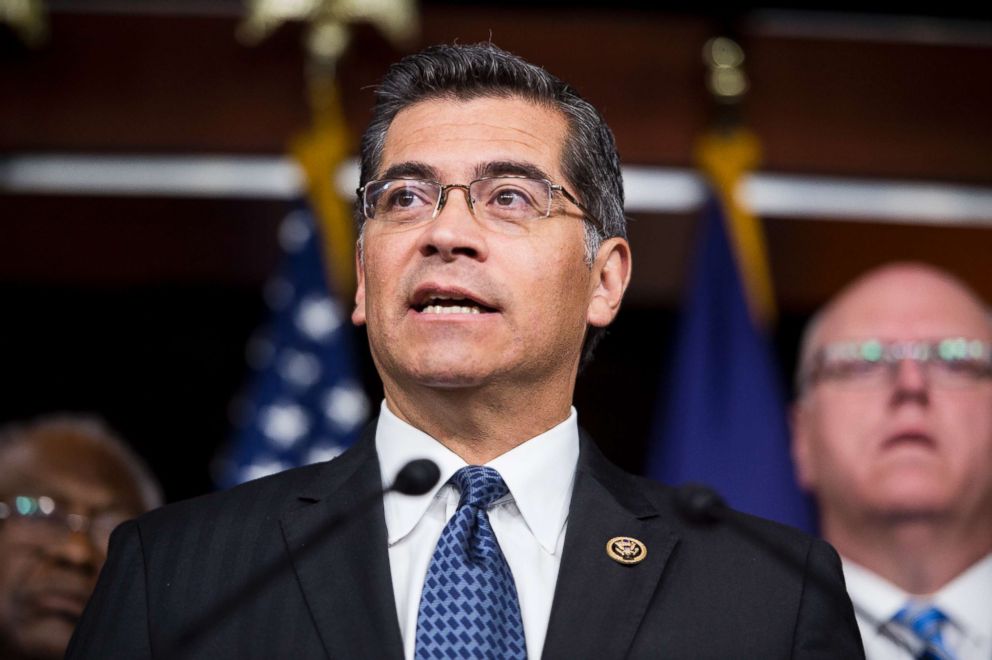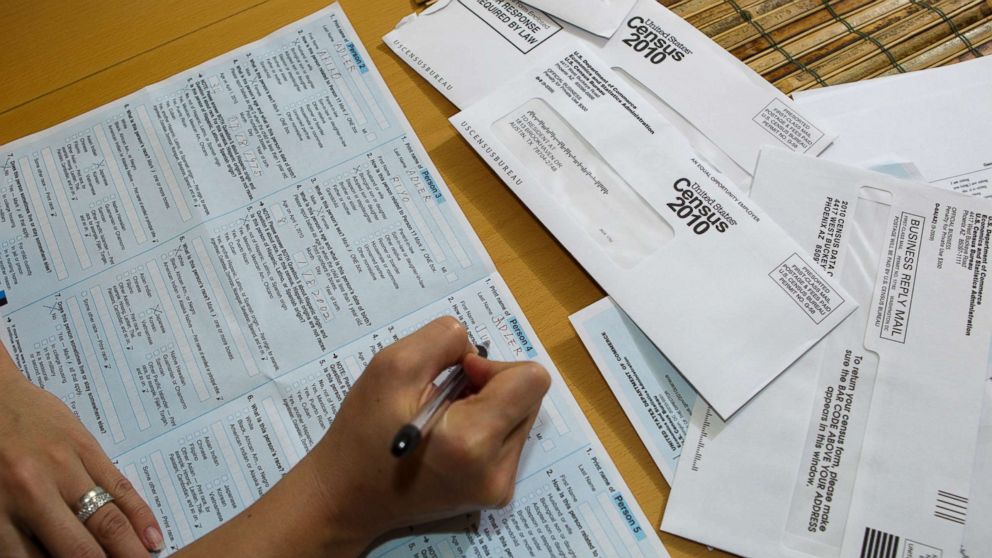Citizenship question on census form could cost states like California a House seat
The decision to include a citizenship question on the 2020 census form could have far-reaching electoral consequences, which could cost states ranging from California to Illinois to Alabama a House seat.
But the ultimate cost could come in the way the population in this country is counted, shifting it from an urban focus to a more rural centric approach, which would benefit Republicans and hurt Democrats, according to experts.
On Monday night, the Commerce Department announced that, for the first time since 1950, a question on citizenship status would be reinstated to the 2020 census — a move which sparked outrage from Democrats and civil rights groups, who are concerned about potential suppression of participation by non-citizens.
If the count among that population group – which tends to be comprised mainly of ethnic minorities who reside in cities – is down, that could affect the reapportionment process that determines how the 435 House seats are divided among the states.

Arturo Vargas, the executive director of the National Association of Latino Elected and Appointed Officials (NALEO) Educational Fund called the administration’s decision “a scare tactic to try to scare Latinos and others from participating in the 2020 census.”
Four past census directors have argued that it’s not “possible to accurately obtain a count of voting age citizens by inquiring about citizenship status.”
In a brief they filed with the U.S. Supreme Court for a 2016 voting rights case, the former directors pointed out that non-citizens, in particular, are anxious about government’s collection of information.
“There would be little incentive for non-citizens to offer to the government their actual status; the result would be a reduced rate of response overall and an increase in inaccurate responses,” they wrote.
Data from the census isn’t just used to determine congressional districts but also the distribution of federal tax dollars throughout the country.
A bipartisan group of 160 mayors wrote to Secretary of Commerce Wilbur Ross last month, following a Justice Department request for the census to reinstate the question, asking him to reject the request.
“An inaccurate census leads to underrepresentation and fewer dollars for many of our most vulnerable communities,” they wrote.
The Department of Commerce says they don’t know the impact of the citizenship question but argues the additional data collected is worth the answer.
“The Department of Commerce is not able to determine definitively how inclusion of a citizenship question on the decennial census will impact responsiveness,” Ross wrote in a memo that accompanied the announcement.
“However, even if there is some impact on responses, the value of more complete and accurate data derived from surveying the entire population outweighs such concerns.”
A final list of the 2020 census questions is due to Congress by the end of March and one Democratic lawmaker has already vowed to use the legislative process to remove the citizenship question.
The Political Fallout
Between 20 and 22 million non-citizens are expected to be counted in the 2020 census – about half of whom would be illegal residents, according to Steven Camarota, the director of research at the Center for Immigration Studies, a group which advocates for stricter immigration limitations.
And immigrants can have a huge effect on how House seats are appropriated.
The 40 million immigrants (citizen and non-citizen) counted in the 2010 census resulted in the redistribution of 18 House seats, Camarota wrote in a 2013 analysis.
He pointed out that of those 18 seats, “16 went to states that voted for President Obama in 2012. Thus, from a partisan perspective, immigration tends to benefit Democrats.”
If there’s an undercount among illegal residents in the 2020 census, one of the biggest states impacted could be California, which is on the verge of losing a House seat.
Election Data Services, a political firm which specializes in redistricting issues, examined the 2017 population data and predicted in December that California was on the cusp of losing a seat.
Kimball Brace, president of Election Data Services, told ABC News that if there is an undercount “California, would for the first time in their 160-year history, would be losing a congressional seat.”
California Attorney General Xavier Becerra filed a lawsuit against President Donald Trump’s administration on Monday night. The state “simply has too much to lose for us to allow his Administration to botch this obligation!” he wrote on Twitter.
Here's the lawsuit we filed last night against @realdonaldtrump's #census2020 decision. #California simply has too much to lose for us to allow his Administration to botch this obligation! #citizenship pic.twitter.com/Kp1WWJ3jC8
— Xavier Becerra (@AGBecerra) March 27, 2018
Besides California, other states could feel the impact of the decision.
Illinois is another state on the borderline of losing a House seat. An undercount in urban areas like Chicago or Aurora, which have large immigration populations, could make that a reality.
Additionally, Arizona and Colorado were predicted to gain a House seat after the 2020 census. That could change with this new question on the form.
Texas was predicted to get two or three seats in a post-census map. The Lone Star State could lose one or two of those. Florida was predicted to gain two seats and that could change also.
Then there are states that don’t seem likely candidates for being impacted by this but could be, such as Alabama, which is on the verge of losing a seat.
“Alabama doesn't have a large immigrant community, but it also wouldn't take a lot to impact it. And since the one Democratic district in Alabama is a majority-minority district, the lost seat would almost certainly be one that Republicans currently control,” said Michael Li, a redistricting expert at the Brennan Center for Justice.
The Redistricting Process
In 2016, the U.S. Supreme Court ruled unanimously in Evenwel v. Abbott that the total population of a place can determine the lines of its districts, a defeat for conservative groups that wanted the lines determined by the number of people eligible to vote.
Some strategists worried Republicans could use the results from the 2020 census to argue non-citizens should not be counted toward the determination of voting lines.
That would be a “killer for Democrats,” one expert on voting told ABC News.
“There is nothing stopping anyone at this junction to trying to challenge the Evenwel decision,” said Vanita Gupta, a former Justice Department attorney under President Obama who is now president of the Leadership Conference on Civil and Human Rights.
But, she added, “the census exists for one purpose and one purpose only and that is to count every person in the country.”

Brace points out that “we’re undergoing a sea change in how we’re looking at redistricting.”
The U.S. Supreme Court recently declined a Republican-backed request to put a hold on the new Pennsylvania congressional map after the state’s high court ruled it had to be redrawn because it constituted an illegal gerrymander which favored the GOP.
But including a citizenship question on the census form could swing the redistricting process back in the GOP’s favor if it suppresses the illegal immigration population from participating, Brace said.
“We’ve got this pendulum going back conceivably toward the Democratic side. Would the citizenship issue cut short that pendulum swing? That’s a possibility,” Brace said.
The Legal Fallout
Legal scholars argue that the constitution requires the entire population of the United States to be counted. They cite Article I, Section 2 which calls for the “actual Enumeration” of the population.
“The Constitution requires the government to conduct an ‘actual enumeration’ of the total population, regardless of citizenship status. And since 1790, the census has counted citizens and noncitizens alike,” Becerra and California Secretary of State Alex Padilla wrote in the San Francisco Chronicle.
Former attorney general Eric Holder, the chairman of the National Democratic Redistricting Committee, said his group will sue the administration over the decision.
“Contrary to the Administration’s stated rationale, asking the citizenship question on the census is not critical to enforcing the Voting Rights Act. As attorney general, I did not — nor did my predecessors — request the addition of a citizenship question to the decennial census to enforce the VRA. We did not need to: Data derived from the existing census process was perfectly adequate for any voting litigation that arose,” he said in a statement.
The NAACP and Prince George’s County, Maryland — one of the largest predominately black counties in the country — also announced plans to sue.
Mike Gonzalez, a senior fellow at The Heritage Foundation, when asked if the total population should be counted, pointed out “they will be” because there won’t be a suppression among non-citizens. He called the decision a “small change.”
“This is not as a big as deal as they are making it out to be. This is a very simple thing that is traditionally asked,” he said.
Those who support including the question point out that the American Community Survey – a yearly survey of U.S. households – does include a citizenship question.
The survey goes out to roughly 3.54 million houses and its results are not used in the reapportionment process that determines the distribution of House districts. The 2010 census found that 300.8 million people lived in 116.7 million households.
Another concern is that field tests for the 2020 U.S. Census are currently underway in Providence, Rhode Island, and there won’t be time to include the citizenship question in those tests. And because the question cannot be tested, its effect cannot be determined.
Terri Ann Lowenthal, a policy advisor to The Leadership Conference Education Fund, said: “they basically will be going into this census with a blindfold on.”




